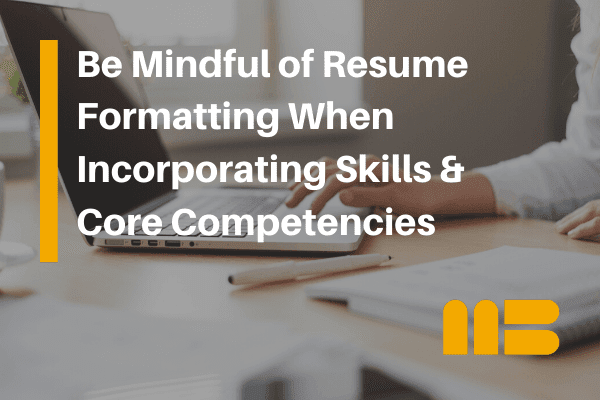We have found that hiring companies that have experienced the most significant success also clearly understood their core competencies, and their recruiting process revolved around them. As a job-seeker, it is essential to use these core competencies on your
Once you understand the company’s core competencies you are interviewing with, a best practice for your resume is to incorporate them on lists, headlines, and your
This article will show you the following:
- What the definition is of core competency
- Examples of core competencies at leading companies
- Why it’s essential to include core competencies on a
resume - What are the best core competencies for a
resume - A list of core competencies for a
resume - Formatting core competencies on a
resume examples
What is the Definition of Core Competency
A core competency is a concept in management theory introduced by C. K. Prahalad and Gary Hamel. They defined it as a ‘harmonized combination of multiple resources and skills that distinguish a firm in the marketplace and therefore are the foundation of companies‘ competitiveness.
Core competencies fulfill three criteria:
- It provides potential access to a wide variety of markets.
- Should make a significant contribution to the perceived customer benefits of the end product.
- Difficult to imitate by competitors.
For example, a company’s core competencies may include precision mechanics, fine optics, and microelectronics. These help it build cameras, but may also be useful in making other products that require these competencies.
Thus, understanding a company’s core competencies and comparing them to your background is very important in job-seeking, particularly
Why Are They Important in Business?
Core competencies allow businesses to deliver value to their customers and set themselves apart. It’s probably a company’s core competency if it is difficult to copy or develop. A business can build its core competencies by identifying key strengths and investing in the capabilities valued by its customers.
 Ways that companies can set themselves apart include but are not limited to the innovation of products, quality, reliability, customer service, and technology.
Ways that companies can set themselves apart include but are not limited to the innovation of products, quality, reliability, customer service, and technology.
Examples in Business:
- Reliability and dependability
- Resilience and adaptability
- Collaboration
- Communication
- Organizational skills
- Problem-solving skills
- Ethical responsibility to self and others
- Human behavior
- Oral communication
- Quantitative reasoning
- Flexibility and adaptability
- Initiative
- Interpersonal skills
- Leadership skills
Upon understanding the core competencies of a business, many will devote resources to further develop and enrich their expertise in this area. One of the ways they do this is through an evidence-based recruiting process, and another is through their corporate strategy in team meetings, new-hire training, and continuing education. Top companies focus on their core competency intently to become even stronger.
We have found that the companies that have experienced the most significant success also understood their core competency and ensured that everyone on their team knew it.
Asking for a Friend, Are Core Competencies and Skills the Same?
Glad you asked. So what is the difference between skills, such as fast learner or experienced trainer, and core competency?
As you may know, skills are learned activity that requires proficiency and ability. Skills are what you learn that enable you to perform specific tasks. Typewriting, computer use, and tire change are examples of skills.
On the other hand, core capabilities refer to knowledge and expertise in a given area. As mentioned above, examples of core competencies can be quality, the innovation of products, or customer service.
Why Knowing Them Is Important?
 If a company develops and protects its core capabilities at all costs, you can imagine how important it is for you as a job seeker to fully understand what they are and how your background enriches them.
If a company develops and protects its core capabilities at all costs, you can imagine how important it is for you as a job seeker to fully understand what they are and how your background enriches them.
We have found that the companies that have experienced the most significant success also clearly understood their core competency. They make sure that everyone on their team knows what it is. That goes for the recruiting process, hiring, and onboarding. You can bet that how you enrich their core competencies will be a considerable part of the process.
How to Choose the Best Core Competencies for a Resume
As you might know, job seekers often use core competencies synonymously with professional skills. That’s ok because there isn’t much room when you’re formatting and updating your
To determine what core competencies to put on your
Take a good look at the job offer you’ve targeted, and identify what core competencies the employer expects of the candidates. Note down these core competencies.
Return to your original core competencies list, and see which ones your list and the job ad share.
Found them? Great! These are the core competencies your
List of Core Competencies For Your Resume
As mentioned above, job seekers often use critical competencies synonymously with professional skills.
Remember that you need to identify with the values and competencies of the target company. Once you know that, you can tailor your importanta competencies on a
 Ambitious: Is having or showing a strong desire and determination to succeed
Ambitious: Is having or showing a strong desire and determination to succeed
Avid learner: This shows that you are very eager or enthusiastic and willing to learn
Career-focused: Verifies that you are focused on moving forward in your career path
Results-driven: This means that you always seek to provide the best results
Collaborative learner: This shows that you like to work with other people to solve problems, complete tasks, or learn new concepts
Leadership: Demonstrates your ability to lead a group of people or an organization
Career-focused: Suggests that you are conscious of your career and the choices that affect it
Ambitious: Is having or showing a strong desire and determination to succeed
Flexibility: This shows that you have the willingness to change or compromise when necessary
Teamwork: Indicates you work well with others and thrive in a team environment
Integrity: Indicates that you only submit finished work that meets your high standards
Communication: This shows your ability to share your ideas effectively with clients, coworkers, and managers
Responsibility: Demonstrates that you can act independently and make decisions without authorization
Adaptability: This indicates that you can adjust to new conditions.
Motivation: Involves your ability to keep yourself motivated, along with those around you
Focus: Shows your level of attention to tasks
Time management: Shows your skills in developing timelines and completing projects
Problem-solving: Demonstrates how you evaluate situations and find practical solutions
Teamwork: Indicates you work well with others and thrive in a team environment
Commitment to excellence: Illustrates that you are someone who strives to do their best
Career-focused: Verifies that you are focused on moving forward in your career path
Be Mindful of
Remember that as a job-seeker, it is crucial to understand how to use these core competencies on your
Also, remember to keep your
